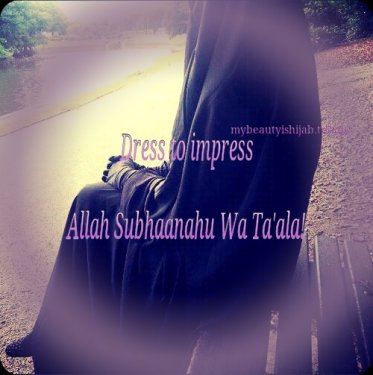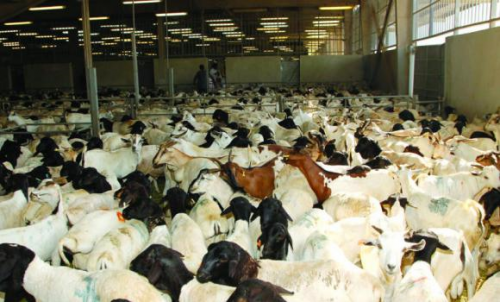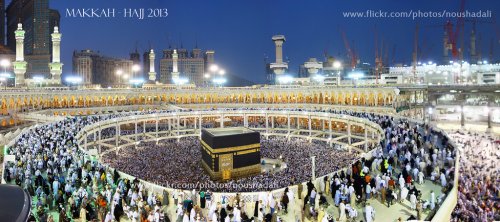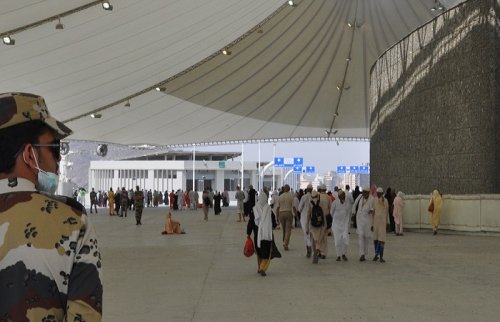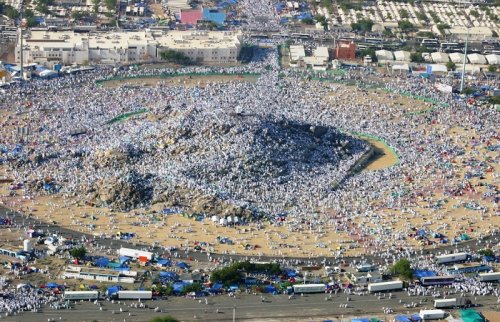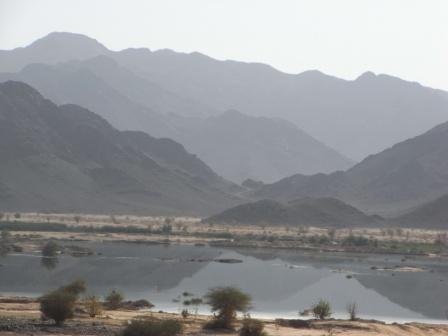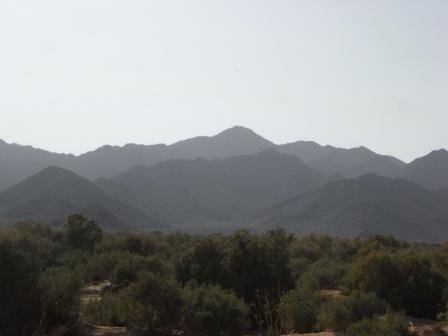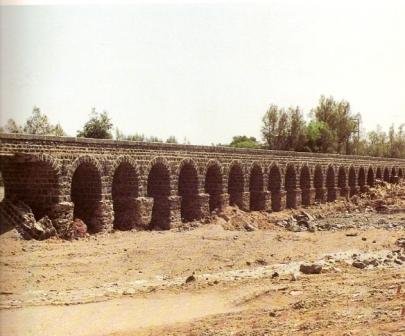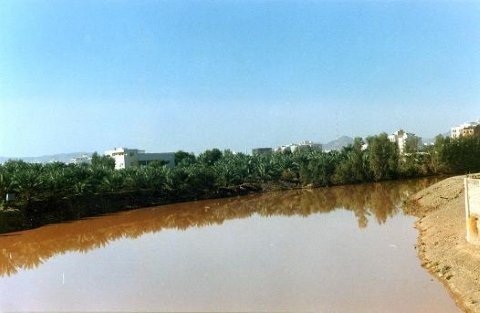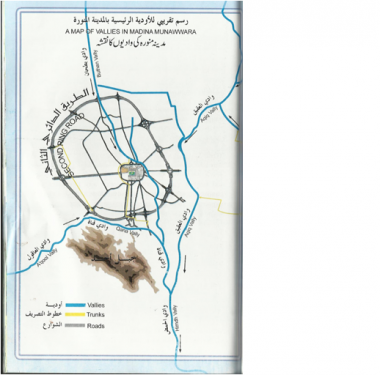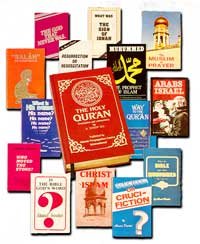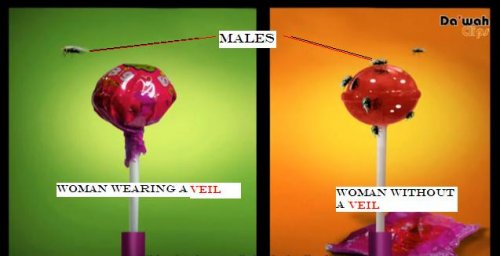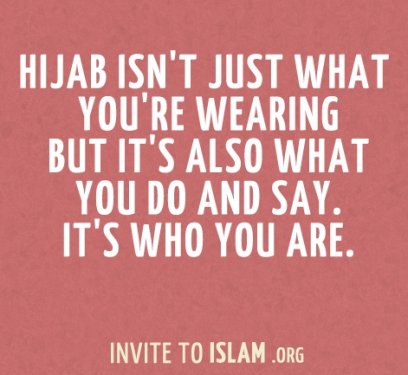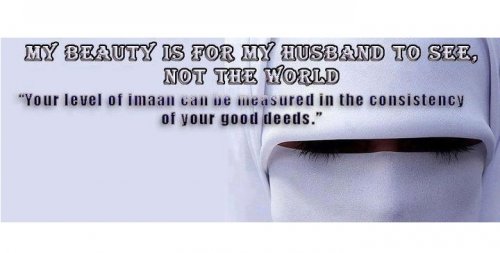-
Posts
8,466 -
Joined
-
Days Won
773
Content Type
Profiles
Forums
Events
Everything posted by ummtaalib
-
-
The Benefits Of Raw Honey Honey in its natural raw state contains 2 predominant natural sugars (Fructose and Glucose) 11 enzymes, 14 minerals, 21 amino acids, all the vitamins that nutritionists consider necessary for health A,D,K, Rutin, Nicotinic acid, B vitamins, Thiamine, Riboflavin, Niacin, Pantothenic acid, Pyridoxine and Biotin as well as Ascorbid Acid (Vit. C.). HONEY PROCESSING Most honey sold today has been commercially processed, resulting in enzymes (which help digestion) and vitamins, being destroyed and protein (pollen) being removed. This processing involves heating and filtering through a cloth or fine filter paper. The end product will remain in a liquid state for a long period of time. When it finally starts to granulate, crystals will begin to form at the bottom of the jar, moving upwards (a sure sign of a refined and processed product, despite the label “Pure” Honey). WHAT CAN RAW HONEY DO FOR YOU? Raw Honey was and still is credited with marvelous curative powers. A whole book could be written on all the medicinal uses of honey, from thousands of years of folk medicine to the scientific of the present time. In addition to its age-retarding properties raw honey has been proven to be from beneficial to extraordinary effective in the following: * As honey is a pre-digested food (a process done by the bees) it enters the blood stream directly producing energy quickly, unlike refined sugar which has to be digested. * Proline, an amino acid in Raw honey is the primary component in collagen. Collagen is the main structure in bones. (Proverbs 16.24—health to the bones) Calcium is also found in two forms in Raw Honey. * Increases Haemoglobin count and can prevent or cure Anaemia. It is rich in iron and copper. * Is an excellent mild laxative, especially recommended as such for infants and children. * Raw Honey will prevent and even cure Botulism Poisoning, because it contains an enzyme called Glucose Oxidase, (this enzyme is easily destroyed with heat). Botulism spores can only develop in the intestines of infants when chronically constipated. * It has been shown to be useful in Rheumatic and Arthritic cinditions, especially in combination with Apple Cider Vinegar (Dr D.C. Jarvis). * It has been used successful in the treatment of liver and kidney disorders, diseases of the respiratory and digestive tracts, weak heart action, infectious diseases, colds, insomnia, poor circulation, and bad complexion. * It is not mere theory, but has been proved that bacteria cannot live in the presence of raw honey, for the reason that raw honey is an excellent source of potassium. The potassium draws from the bacteria the moisture which is essential to the very existence. A bacteriologist who did not believe this, after a series of tests discovered to his amazement that the disease germs he tested (typhoid, Bronco-pneumonia and Dysentery producing germs) were all killed off in the presence of raw honey. * In this book “Folk Medicine”, Dr Jarvis an ear, nose and throat specialist reveals some startling facts about raw honey and honeycomb. He says the honeycomb is excellent for the treating of stuffy nose, nasal sinusitis and hay-fever. He always says that raw honey can produce healing for skin burns and is essential in the diet of children because it provides the composite of minerals needed for the growing body ( iron, copper, manganese, silica, chlorine, potassium, sodium, phosphorous, aluminium, magnesium, zinc, lead and sulphor ). * Probably the most beneficial effect of pollen (contained in raw unfiltered honey) is that, taken internally it quickly produces the same anti-putrefactive effect as lactic foods and thus contributes to a healthy digestive system and good assimilation of nutrients—absolute prerequisites for good health and long life. Eating pollen rich raw honey causes rapid combustion, consuming fats which speed up the burning of fat, and continues through the bloodstream at a trickle stimulating the heart without harmful side effects. Nu-Life Beekeepers, P.O. Box 71, Harding, 4680 http://www.themajlis.net/Article47.html
-
-
770,000 sheep sacrificed during Haj A HAJ MUST: Sheep and goats await ritual sacrifice at a Mina slaughterhouse. 20 October 2013 A total of 770,000 sheep were sacrificed during this year's Haj, according to the Islamic Development Bank (IDB). IDB Chairman Ahmad Mohamed Ali thanked pilgrims for supporting the bank's initiative to oversee the Haj animal sacrifice project, which is aimed at providing charity for needy people in the Kingdom and across the world. In his remarks on the project’s website, www.adahi.org, he said the IDB allows Muslims from all over the world to get blessings from sacrificing animals. Ali thanked Custodian of the Two Holy Mosques King Abdullah and other Saudi leaders for overseeing the project. He called on Allah to accept the Haj of pilgrims and to protect them on their way home. http://www.arabnews.com/news/468242
-
HAJJ 1434/2013 STORIES A blind pilgrim sees the light 18 October 2013 MINA — His blindness did not prevent him from seeing the light of faith in the holy sites. He said though he was born blind, he could see the Haj rituals clearly in his heart. Abdul Moneim Naji, a Yemeni from the city of Hudaidah, was given the Haj visa as gratis by the Saudi consul in Yemen. He is performing the pilgrimage for the third time in his life. "Allah made me blind since I was born to upgrade my level in this life and the life after and to listen to my voice," he said. Naji said he was completely in harmony with himself, has peace of mind and is at peace with his blindness. He has four other blind siblings. Naji said after graduating from elementary school, he had joined a Qur'an memorization school where he has memorized the entire holy book by heart. "I felt the great difference in the Haj services being provided to the pilgrims this year in the accommodation, transportation and bathrooms," he said. Naji was thankful to Allah for giving him tranquility and peace of mind in place of his eyes. http://www.saudigazette.com.sa/index...20131018183890 ‘Fitna’ producer finds peace in the holy sites Arnoud Van Doorn talks to Okaz/Saudi Gazette reporter in MIna. 18 Oct 2013 MINA — A once strident anti-Islam activist who gained notoriety as the producer of Fitna, a derogatory film wrongly portraying Prophet Muhammad (peace be upon him), has found peace and tranquility while performing Haj this year. Arnoud Van Doorn, a former member of the Geert Wilders racist Dutch Party for Freedom, reverted to Islam a year ago after propagating against the divine religion for years. Van Doorn bitterly regrets having taken part in the production of the hateful film Fitna (Sedition) and said he was in the holy sites to atone for his sins. “I found myself among these faithful hearts. I hope that my tears of regret will wash out all my sins after my repentance,” Van Doorn said. He said, as a token of atonement, he will produce a new film that will show the true essence of Islam and the correct personality of Prophet Muhammad (pbuh). Van Doorn described Fitna as a totally wrong movie which contained a lot of misleading and incorrect information that had nothing to do with the noble divine religion or its great Prophet (pbuh). He said that since his arrival in this holy land, he has been living the best days of his life and he hoped that he could spend more time in Madinah to which he was determined to return after the completion of his Haj rites. “I felt ashamed standing in front of the Prophet’s grave. I thought of the grave mistake which I had made by producing that sacrilegious film. I hope that Allah will forgive me and accept my repentance,” he said. Van Doorn said he read a lot about Islam and regretted his erstwhile hostility to this great religion. http://www.saudigazette.com.sa/index...20131018183961 Young man carries an elderly from Arafat to Mina 18 Oct 2013 It was a heart-warming gesture that best conveyed the true essence of the Qur’anic verse “All the faithful are brothers.” Tweeters posted a photo of a non-Arab young man carrying an elderly Haji. The picture revealed that the young man wasn’t relat- ed to the older one. The young man said he carried him because “Islam teaches us to be like brothers to one another.” The caption in the photo said one of the pilgrims wanted to commend the young man for doing the right thing to his father, but the young man said: “This isn’t my father, I found him alone in Arafat, so I carried him on my back to Muzdalifah and then to Mina,” said the young man. When asked why he did it, he merely said: “All the faithful are brothers.” http://www.arabnews.com/news/468070 American rapper changes songs into supplication 18 October 2013 MADINAH — Famed American rapper George Green, who embraced Islam about two years ago and is called Ibrahim, has replaced his songs with Duaa (supplication) and Tahleel since he has set foot in the Kingdom to perform Haj. "Unlike singing, I feel the greatness of God every time I do Duaa. I also have the satisfaction from feeling completely submissive to Allah," he said. Ibrahim has been invited to the Haj by the Canadian Call (Dawah) Society and is being accompanied by the society's Chairman Shahzad Mohammed who prepared a complete program for him to visit a number of places in Makkah and Madinah. Mohammed said his society was keen to invite famous stars who have embraced Islam to the Haj so as to spread the religion among their fans. During his stay in Madinah, Ibrahim has met with the imam of the Prophet's Mosque Sheikh Salah Al-Bidair who advised him to make efforts to spread Islam and to convey its true image wherever he may be. http://www.saudigazette.com.sa/index...20131018183889 Pilgrim fulfills pledge to serve his mother 19 Oct 2013 MINA — A Pakistani pilgrim has set a shining example of how a son can be grateful to his mother. He carried his old mother on his back at a brisk pace under the sun in order to get her to the train station. Other pilgrims admired Muhammad Amin for his service to his mother as he stormed his way through the crowds. Though Okaz reporter tried to talk to him, he did not reply as he was focused on his mission: getting his mother to a safe place from the sun. The reporter followed Amin till the station, where Amin told him that his mother was sick and he was worried about her. “I have always wanted to serve my mother during Haj. My beloved mother went into coma right after she gave birth to me and almost died. Ever since my father told me that, I made a promise to carry her on my back during Haj, knowing for sure that I’d never be able to pay her for what she did for me.” Amin came to the Kingdom few years ago and kept saving money in order to pay for his mother’s Haj. http://www.saudigazette.com.sa/index...20131019183981 Pakistani man’s wish to die in holy sites comes true 19 Oct 2013 HOLY SITES — She was waiting for his return from stoning the Jamarat Wednesday evening. She was greatly concerned. She felt that something has taken place. That afternoon Adhra Izra, 60, was joking with her husband about death before he left for the Jamarat Bridge, where he had a heart attack and died after completing the stoning of the Jamarat. He was taken to Mina Al-Jisr Hospital where the doctors confirmed his death. When his wife was informed of his death she fainted. She was taken to the same hospital. After a few hours she was released from the hospital to her country’s Haj camp where she received condolences on her husband’s death. The doctor of the Haj group told Okaz/Saudi Gazette not to press her to speak on the incident so that her condition does not deteriorate. He said she was suffering from heart disease, blood pressure and diabetes. Therefore, her brother narrated what happened. He said his brother-in-law had a wish to die in the holy sites. Allah accepted his supplication, so he died after stoning the three Jamarat on the first Tashreeq Day. http://www.saudigazette.com.sa/index...20131019183982 Mother's ten-hour ordeal after losing daughter 19 Oct 2013 MINA — A mother lived through the most difficult ten hours of her life when she lost her daughter in Arafat on Oct 14. Neda’s mother and father kept searching for her among the sea of crowds to no avail. Her mother broke down and cried, thinking the unthinkable. They waited and waited for hours but could not find her even after pilgrims left Arafat and Muzdalifah. The next day, the father’s phone rang. He could not believe it when he heard the voice of his six-year-old daughter Neda at the other end telling him she was safe and sound at the center of lost children in Mina. Immediately, the father and mother headed straight to the center. They found Neda laughing and playing with female guides who found her and brought her to the center. Neda’s father said he prostrated on the floor thanking Allah for returning his daughter. Maha Fetaihi, head of female guides, said all women took a year-long course on how to deal with lost children and serve pilgrims who lost their loved ones during Haj. “There are 16 ladies and a psychologist who deals with kids who get scared and cry because they are away from their parents.” http://www.saudigazette.com.sa/index...20131019183984 Blind Tunisian woman regains eyesight in Arafat Nafeesa Al-Qurmazi 20 October 2013 HOLY SITES — After 18 months of living in complete darkness, a Tunisian woman pilgrim regained her eyesight while standing on Arafat at the climax of the Haj. The 70-year-old Nafeesa Al-Qurmazi, mother of two boys and three girls, said she came to the Kingdom for Haj totally blind and is now going back to Tunisia with her full eyesight. She lost her eyesight after she had a stroke about a year and a half ago. The doctors lost all hope that she would regain eyesight due to the severity of the stoke and her age. "I have never lost hope in the providence of Allah. I kept praying to Him all the time to give me back my eyesight," she said. Qurmazi said she decided to increase her Duaa (supplication) in Arafat and was sure that “Allah would not disappoint me. While doing the Duaa in Arafat I suddenly started to see. When the other pilgrims in my tent saw me crying with joy, they all started chanting Allahu Akbar," she said. Qurmazi said all the way from Tunisia she had been cherishing one dream: To see the holy sites, Makkah and Madinah. "Thank God now I can see and walk anywhere without any assistance from anyone," she said. She said she was overjoyed to see the pilgrims in Arafat, a scene she never expected to be true to her. "Allah has blessed me with my eyesight in the most sacred place on earth," she said. http://www.saudigazette.com.sa/index...20131020184082
-
HAJJ 1434/2013 (Pictures and articles posted by Sister Roukaya Here) Click on pictures to enlarge According to Saudi authorities, 1,98 million pilgrims attended the Hajj, against 3.16 million in 2012. The pilgrims came from abroad reached 1.38 million, against 1.75 million last year. Final day: Hajis weary but elated 18 October 2013 The fifth and final day of Haj on Thursday drew 2 million pilgrims from nearly 200 countries in what is regarded as one of the most successful seasons ever. Trains ferried pilgrims to the holy sites with few problems and thousands of volunteers, including 150 Saudi women staffing the trains, made sure that Haj 2013 was trouble-free. On the last day, pilgrims arrived at the Jamarat complex early to throw their seven pebbles each at the three concrete structures to defy Satan. Military men joined in to help the children perform their rituals. Many pilgrims returned to their temporary quarters in Makkah and Jeddah before taking flights back to their home countries this week. http://www.arabnews.com/news/468079
-
Q. It is known that to use antimony is Sunnah, antimony doesn't disturb penetration of water and purification over antimony is valid. It is right concerning antimony in powder. However Islamic shops sell antimony in the form of paste, when powder is mixed with various other ingredients, for example, with the oil. Whether it is possible to use such antimony? If it's possible, can we buy such antimony in a tube and to do ablution over it or is it necessary to check its structure? A. Kohl is usually applied along the rim of the eye. It is not necessary to wash the part of the rim of the eye that is not visible when a person normally shuts his eyes. However, it is necessary to wash the part of the rim of the eye that is visible when the eyes are naturally closed. (al-Muheet al-Burhani, Vol: 1, Pg: 33) So if the Kohl is applied to this part of the rim of the eye which is not visible when the eyes are naturally closed, it will not be necessary to remove when making Wudhu even if it is non-permeable paste. If the Kohl exceeds this part of the rim of the eye and is applied onto the skin that is visible when the eyes are closed, it will be necessary to remove the antimony when making Wudhu if it does not allow water to reach the surface of the skin. It should be noted that the type of Kohl that is specifically encouraged to use in the Hadith is Ithmid. This is a special type of Kuhl (Kohl) and has many benefits. The Prophet of Allah (Sallallahu Alaihi Wasallam) said: The best Kohl to use is Ithmid, it improves the eyesight and assists in the growth of the eyelashes (Nasai, Hadith #: 5113) NB. There are many brands of Kuhl available in the market including those that are marketed with the name of Ithmid. Unfortunately, many of these are not genuine and contain a high amount of lead, and some even contain menthol and camphor which may be harmful to the eye. A person is advised to apply caution when selecting Kuhl. As indicated in the Hadith, the best is Ithmid. The genuine Ithmid is usually brownish/reddish in colour. And Allah Knows Best Mufti Suhail Tarmahomed Fatwa Department Jamiatul Ulama (KZN) Council of Muslim Theologians 223 Alpine Road, Overport, Durban
-
- 1
-

-
Continued from Previous Post.... Al-Ghaba (Khulail) Mentioned in the previous post is a place north of Madinah and west of Mount Uhud. It is presently called Khulail and is at a distance of twelve kilometres from Masjid Nabawi. A dam has been built there to provide for local water consumption. Panoramic Photo - Khulail Dam Al-Ghaba Dam Even though the rains were sufficient to form this picturesque lake, the valleys did not flood enough to flow over the dam wall (Pictures from Al-Miskeenah) What is left of the Al Ghaba Forest The Mimbar of Rasoolulllah sallallaahu 'alayhi wasallam was built from the timber taken from the trees of Ghabah. He initially delivered the Khutbah leaning on a palm tree trunk which was positioned near the original Mihrab. During the eighth year after hijrah, when the number of Sahabah had greatly increased, and it was difficult for the assembled crowd to see and hear the Messenger of Allah SallAllahu alaihi wasallam, it was suggested that a new raised Mimbar be constructed. Zubair bin Awwam's estate was here. Twenty camels of the prophet sallallaahu 'alayhi wasallam were once grazing in the area of Ghabah. A platoon of Abdur Rahman al Fazari attacked and killed the herdsman and took the camels. Salamah bin Akwa' (RA) heard and he called out to his companions at the eastern Thaniyyatul Wadaa and set out himself pursuing the attackers. He threw stones and arrows at them saying, "Take this and I am indeed the son of Akwa'.. ...Today is the day of Rudda' (i.e. to pay your due for suckling)". He carried on until the Muslims reached him and they took back the camels. This event is mentioned in Sahih Bukhari: Hadith number 4194.
-
VALLEYS OF MADINAH MUNAWWARAH Map of the Valleys of Madinah Picture scanned from "Pictorial History of Madinah Munawwarah" (Click on picture to enlarge) *Note: وادي Wādī is the Arabic term for a dry river or its valley. It is the Arabic term traditionally referring to a valley. In some cases, it may refer to a dry (ephemeral) riverbed that contains water only during times of heavy rain or simply an intermittent stream. Valley of Al-Aqeeq وادى العقيق Ottoman Bridge over the Al Aqeeq Valley Al Aqeeq Valley Stream This valley starts at Taif and passes through Madinah and comes to an end at Ghabah (Khulail) where it merges with the valleys of But’haan and Qanaat. It is one of the longest valleys of Hijaaz. It has two plains in Madinah: In smaller plain lies the well of Uthman and the Islamic University of Madinah, whereas in the larger plain lies Abyar Ali, the well of Urwa and its surrounding areas. As mentioned in Saheeh Bukhari: In the valley of Al-'Aqiq I heard Allah's Apostle saying, "To night a messenger came to me from my Lord while I was in the Aqeeq (Valley) and said to me, 'Offer prayer in this blessed valley.'" This valley has attracted the interest of many rulers and wealthy personalities for irs sweet waters, pleasant atmosphere and soft highly cultivative earth. Many Arab poets and novelists have mentioned this valley in their works. "Pictorial History of Madinah Munawwarah" Dr. Muhammad Ilyas Ghani Excavation has led to the discovery of an ancient palace in the Valley of Al Aqeeq A recent archealogical excavations by a team from the Antiquities and Museums in SCTA, carried out in Wadi Al Aqeeq of Al Madina province, during the second season of its excavation (2012/1433), has led to the discovery of an ancient palace dating back to the 1st century Hijri, along with a number of relics, such as ceramics pots, glass jars, stone-tools and several vessels made of soapstone. The head of the excavation team, Dr. Khalid bin Mohammad Ascoby, has stated that the preliminary studies of the architectural elements and the discovered archeological relics have confirmed the age of the palace as dating back to the first century, Hijri era. Dr. Ascoby, further stated that the Antiquities and Museums department, during its two consecutive seasons, has made archeological excavations near Wadi Al Aqeeq in its south-eastern part, which is collectively known as the “Erowah Palaces”. The area represents an archeological hill of medium-height on which are found a spread of several pottery fractures and volcanic stones. In this valley they discovered for the first time the remains of a historic palace, the area of which is about 40m x 30m, in addition to a number of unique and rare relics dating back to the Umayyad era (1st century AH). Remains of Saeed bin Assas palace On the architectural elements of the palace, Dr. Ascoby said that his team has detected the architectural foundations in the palace representing eight units of rooms distributed within the palace. The palace walls are built with volcanic stones plastered with gypsum and mud. Most of the discovered rooms had floor-covering made of compacted mud. As for other archeological findings, Dr. Ascoby said that the find included variety of pottery, glass vessels, stone tools and utensils made of soapstone and other ceramic products, such as jars, pots, water jugs, pitchers, small vessels, cups and dishes. The findings also included lustrous earthenware which reflects advancements in Islamic ceramic industry during the 1st and 2nd Hijri centuries. Similar ceramics have also been discovered in Al Mabyat and Al Rebza Islamic sites. A huge quantity of broken glassware representing cups and vials, as well as pots of varying shapes and sizes were found. Some of these fragments carry multicolored decorations, in addition to a set of completed stone tools and semi-completed parts of utensils, including grindstones made of volcanic rocks and some incomplete millstones among others. Wadi Aqeeq is one of the most famous valleys in Al Madina Province, which is a part of the history of Madina, where it is mentioned in many historical, geographic and religious sources. Al Hijaz Railway line, during the Ottoman era, was passing over a bridge connecting the two shores of the valley. Also Erwa and Al Ghaba dams were built over this valley. The length of the valley is about 80 km, and its bed depth ranges between 10 to 100 meters along its course, with a top width ranging between 100 to 150 meters. The valley is a natural drain for floods and rain water for approximately an area of 400 square kilometers; over 40 tributaries and streams drain into Wadi Al Aqeeq. Source of Article
-
The Ahmed Deedat Collection By Ahmed Deedat Sheikh Ahmed Hoosen Deedat was Born on the 01 July 1918 in the Surat district of India in 1918. His father emigrated to South Africa in 1927 with him. After reading a book called Izharul Haq – The Truth revealed, a book about a debate with Christian Missionaries in the then British India, Sheikh Deedat was spurred on in the direction of Dawah – Islamic Missionary Activity to halt the tide of the then Christian onslaught against Islam. Over the next four decades, he immersed himself into a host of activities. Conducting Bible classes, lectures and debates the world over. He established the first Islamic Seminary in Southern Africa to train propagators at Assalaam educational Institute - Braemar. He is the founder of the largest Islamic Dawah Organization in the world, the Islamic Propagation Center International and became its president. He delivered thousands of lectures all over the world, crossing all the continents and successfully engaging some of the biggest names in Christian evangelists in public debates. Sheikh Deedat’s debates and lectures are available all over the world in the various languages in Video and DVD format. His career in the field of Comparative Religion took him across all five continents and dialogue with the heads of the Protestant world in America. May Almighty Allah bless his soul, accept his efforts for the cause of da’wah and grant gracious patience to his loved ones during this trying time. DOWNLOADS HERE
-
The Ahmed Deedat Collection Sheikh Ahmed Hoosen Deedat was Born on the 01 July 1918 in the Surat district of India in 1918. His father emigrated to South Africa in 1927 with him. After reading a book called Izharul Haq – The Truth revealed, a book about a debate with Christian Missionaries in the then British India, Sheikh Deedat was spurred on in the direction of Dawah – Islamic Missionary Activity to halt the tide of the then Christian onslaught against Islam. Over the next four decades, he immersed himself into a host of activities. Conducting Bible classes, lectures and debates the world over. He established the first Islamic Seminary in Southern Africa to train propagators at Assalaam educational Institute - Braemar. He is the founder of the largest Islamic Dawah Organization in the world, the Islamic Propagation Center International and became its president. He delivered thousands of lectures all over the world, crossing all the continents and successfully engaging some of the biggest names in Christian evangelists in public debates. Sheikh Deedat’s debates and lectures are available all over the world in the various languages in Video and DVD format. His career in the field of Comparative Religion took him across all five continents and dialogue with the heads of the Protestant world in America. May Almighty Allah bless his soul, accept his efforts for the cause of da’wah and grant gracious patience to his loved ones during this trying time. DOWNLOADS HERE
-
"I spent seven years of my girlhood heavily veiled - not in a Muslim nikab but in a nun's habit. I found my habit liberating: for seven years I never had to give a thought to my clothes, makeup and hair - all the rubbish that clutters the minds of the most liberated women." - Karen Armstrong
-
"It is an error of judgment to think that a Muslim woman covers herself because she is a private possession of her husband. In fact, she preserves her dignity and refuses to be possessed by strangers." - Nakata Khaula
-
Islam Was Spread by the Sword? Many non-Muslims, when they think about Islam, picture religious fanatics on camels with a sword in one hand and a Quran in the other. This myth, which was made popular in Europe during the Crusades, is totally baseless. First of all, the Holy Quran clearly says "Let there be no compulsion in religion". In addition to this, Islam teaches that a person's faith must be pure and sincere, so it is certainly not something that can be forced on someone. In debunking the myth that Islam was "spread by the sword", the (non-Muslim) historian De Lacy O'Leary wrote: "History makes it clear, however, that the legend of fanatical Muslims sweeping through the world and forcing Islam at the point of the sword upon conquered races is one of the most fantastically absurd myths that historians have ever accepted." (Islam at the Crossroads, London, 1923, p. 8.) It should also be known that Muslims ruled Spain for roughly 800 years. During this time, and up to when they were finally forced out, the non-Muslims there were alive and flourishing. Additionally, Christian and Jewish minorities have survived in the Muslim lands of the Middle East for centuries. Countries such as Egypt, Morocco, Palestine, Lebanon, Syria and Jordan all have Christian and/or Jewish populations. If Islam taught that all people are supposed to be killed or forced to become Muslims, how did all of these non-Muslims survive for so long in the middle of the Islamic Empire? Additionally, if one considers the small number of Muslims who initially spread Islam from Spain and Morocco in the West to India and China in the East, one would realize that they were far too few to force people to be members of a religion against their will. Additionally, the great empire and civilization established by the Muslims had great staying power -- its citizens were proud to be part of it. The spread of Islam stands in contrast to the actions of the followers of Christianity, who since the time of the Emperor Constantine have made liberal use of the sword - often basing their conduct on Biblical verses. This was especially true of the colonization of South America and Africa, where native peoples were systematically wiped-out or forced to convert. It is also interesting to note that when the Mongols invaded and conquered large portions of the Islamic Empire, instead of destroying the religion, they adopted it. This is a unique occurrence in history - the conquerors adopting the religion of the conquered! Since they were the victors, they certainly could not have been forced to become Muslims! Ask any of the over one billion Muslims alive in the world today whether they were forced! The largest Muslim country in the world today is Indonesia --- and there were never any battles fought there! So where was the sword? How could someone be forced to adhere to a spiritually rewarding and demanding religion like Islam?
-
Da'wah On Wheels by Anisah David, Islamic Horizons, Sept./Oct. 2000 Taking Islam to bikers is helping fulfill their search for truth. Imagine yourself driving down the highway with your family, pleasantly enjoying the view of the Great Plains of the American west, and being overcome by the sound of thunder. It is not the thunder of a distant storm, but the thunder of something you have never experienced. You look around and discover that this commotion is coming behind you, in the shape of a vast army of motorcycles whose helmet-clad riders are traveling en masse. You not only hear the thunder of their engines, but your very bones feel the rumble as they pass you in waves. And as they pass, you note a familiar symbol on the side of each bike and on the backs of each jacket: the bold gold and green symbol of Islam. This is the dream of an American-born revert, Victor David. An avid biker who once lived the rough and rowdy life of an American biker, David is working to make his new dream come true. His goal is to organize a Muslim biker's association -- similar to the Christian Biker's Association -- to bring the message of Islam to bikers. A resident of South Dakota, David would like to develop a nationwide organization that focuses on bringing the message of Islam to people like himself. David embraced Islam in 1998, after learning that his older sister, with whom he had lost contact, had been a Muslim for several years. Studying Islam to prove that it was not the "true" religion, he embraced it 8 months later. Today, only the tattoos remain in a re-born David Tent of Light David's current project is to travel to Sturgis, SD, during the sixtieth annual Biker's Rally in August [2000]. Usually, this event attracts some 275,000 to 290,000 people, and more come each year. He asserts: "It's time that Muslims bring Islam to the people, and this event is only one such event." He is not planning a run-of-the-mill Da'wah activity. Instead, the group would focus on Da'wah by using the common interest of motorcycles. He wants to pitch a tent of enlightenment in Sturgis and invite his fellow bikers to come in, sit with him and fellow Muslim motorcycle enthusiasts, and discuss Islam. David dispels commonly held stereotypes about bikers by stating that they usually are individuals who have decided that the American system does not work and then launch themselves on a search for truth. The organization that plans to begin working in this unique medium is still in its infancy. David hopes that other Muslim bikers will join in this annual endeavor each August, beginning in the year 2002. "We are planning on having a central meeting point in eastern South Dakota somewhere near Brookings, in sha' Allah [by the will of Allah], where we will camp out and organize ourselves before traveling together on to the town of Sturgis in the Black Hills of South Dakota," says David. His organization needs to raise $2,000 for the proposed Da'wah Tent at the rally. He hopes that he can save enough money to purchase a good quality, large canvas marquee that can hold many people at once. Why a tent? David explains with a smile: "A tent is the most suitable form of shelter, since it is also an image that comes to the mind of many when they think of Muslims." "Tents," he continues, "are used on Hajj." David says that a large white tent with green trim would be a sight to see, even in a large rally like Sturgis. "It is sure to catch the attention of some individuals, in sha' Allah," he declares. The biking enthusiast insists that Islam needs to be taught to everyone, not just to university students or a certain social set. "Too often we have ignored the middle and lower classes in America, and then wondered why they didn't know anything about Islam," he said. "I am trying to reach a group I am familiar with, and one who often is outside the social mainstream."
-
Takbeer Tashreeq Story behind the Takbeer Tashreeq Takbeer Tashreeq is the recitation of "Allaahu akbar, La ilaaha [illa Allaahu] Wallaahu akbar, Allaahu akbar wa lillaahil hamd" after every fardh salaah commencing from the Fajr of the 9th of Dhul Hijah until after Asr of the 13th of Dhul Hijjah. (Shami vol. 1 pg. 406) When Ibrahim (AS) began moving the knife on his beloved son, Ismaeel (AS), the angels sent by Allah with a ram exclaimed, "Allahu akbar, Allahu akbar (Allah is the greatest, Allah is the greatest)." Ibrahim (AS) heard the voice of the angels and replied, "La illaah illa Allaahu Wallaahu akbar (There is no god besides Allah, and Allah is the greatest)." His son Ismaeel (AS) heard this conversation and understood that Allah had relieved him from this great trial, thus he replied, "Allaahu Akbar Wa lillaahil hamd (Allah is the greatest, and to Allah belongs all praise)." (Ibid) and Allah Ta'ala Knows Best Mufti Ebrahim Desai http://www.beautifulislam.net/hajj/takbeer_tashreeq.htm
-
The Guests of Allah have returned Abu Hurairah Radhiyallahu Anhu states that Nabi Sallallahu Alayhi Wa Sallam has said: “The Haji and one who performs Umrah are the Ambassadors of Allah. If they beseech Him, He would respond to them, and if they seek His forgiveness, He would forgive them.” (Ibn Majah) Ibn Umar Radhiyallahu Anhu states that Nabi Sallallahu Alayhi Wa Sallam has said: “When you meet the Haji, greet him, shake his hands and instruct him to seek forgiveness for you before he enters his home, for undoubtedly he is forgiven.” (Ahmed) Hajj affords the best training grounds for the revival of one's faith and purity of character. It is the most sublime manifestation of the universal brotherhood of the Muslim Ummah. It is a journey of intensified devotion and discipline. A Haji is therefore expected to display: î A dynamic revival of faith and trust in Allah. î A character infused with humility and purity. î A compelling concern for the general well-being of the greater Ummah. î A commitment to fulfill all obligatory observances. î A pledge to avoid all prohibited deeds. î An understanding of the purpose of life. î A conscious endeavour to prepare for the Hereafter. When Hasan Basri (R.A.) was asked, “What constitutes a Hajj-e-Mabroor?” He replied, “That you return from Hajj turning your back to this world and facing towards the hereafter.” (Al-Tabsirah) May the Almighty accept your Hajj, make it a source of your salvation in this world and the hereafter and grant you the ability to say “Labbaik” to the call of Allah at all times, Ameen. Jamiatul Ulama (KZN) Council of Muslim Theologians 223 Alpine Road, Overport, Durban
-
-
-
-
Virtues of Hajj Shaykh Zakariyya Khandlawi Virtues of Hajj(FAZAIL-E-HAJ).doc
-
Have You Spoken to Your Child Today? By Dr. Aisha Hamdan . Have you had a meaningful conversation together? Do you know what your child accomplished today, how he may be feeling, whether or not he has any concerns? Does your child know that you care about him?In Islaam, the ties of kinship and family are very strong and something that will always be present throughout our lifetime. There are very serious consequences for someone who decides to break these ties. Allah (subhanahu wa ta'ala) says, {Then, is it to be expected of you, if you were put in authority, that you will do mischief in the land, and break your ties of kith and kin? Such are the men whom Allah has cursed for He has made them deaf and blinded their sight.} (Qur'aan, [47]:22-23) The Prophet (sallallaahu 'alayhi wa sallam) said, "Whoever severs the bonds of kinship will not enter Paradise." (al-Bukhari and Muslim). A major component of our familial ties is communication. In fact, without communication there would be little connection between people. Living together in the same household with limited, or even hostile, interaction would not fit the criteria for maintaining the bonds of kinship. To develop meaningful relationships within our families we need to know how to communicate effectively and sincerely with each other. A large part of this involves skills and principles that can be learned through practice and sincere effort. The following is a guide to strengthen these ties that bind. 1) Active Listening. You may be surprised to discover that the most important aspect of effective communication is listening. This means that the listener pays full attention to the speaker and attempts to understand what that person is saying and feeling. The listener should suspend judgment, show interest, and respect what is being said. He or she may then restate the content and feelings to demonstrate that sincerity is present. The Prophet (sallallaahu 'alayhi wa sallam) always gave his full attention to anyone that he conversed with, even his enemies and those with whom he disagreed. In turn, when he addressed his companions, they listened intently and attached importance to everything he said. 2) Level of Understanding. Parents should always keep in mind the age and level of understanding of their child and should speak with him accordingly. The Prophet (sallallaahu alayhi wa sallam) said "Speak to the people keeping in view their level of understanding. Would you like to see them think of what you tell them from Allah and His Messenger as lies?" (al-Bukhari) This is important so that the child will be able to comprehend what is said, the expectations of the parents will not go beyond the capacity of the child and lead to problems, and difficulties will not be placed upon the child unnecessarily. This is particularly pertinent for sensitive issues such as death, personal modesty issues, and adult responsibilities. There are various levels of complexity with each of these and the correct level needs to be chosen for each child. One way to ascertain this is by the type of questions that a child asks. 3) The Manners of a Mu'min (Believer). A believer is someone who believes in Allah's Message and follows the Sunnah of the Prophet Muhammad (sallallaahu 'alayhi wa sallam). In relationships then, a believer would demonstrate honesty, kindness, patience, self-restraint, fairness, trustworthiness, etc. He would avoid teasing, blaming, belittling, mocking, excessive and idle talk, and fault-finding. There are many Qur'anic verses and ahadeeth that give detailed descriptions of this topic such as: {Verily, Allah is with the patient.} (Qur'aan, [2]: 153), {Speak fair to the people.} (Qur'aan, [2]:83), {Kind words and covering of faults are better than charity followed by injury.} (Qur'aan, [2]:263), "A Muslim is a brother of another Muslim. He does not wrong him, nor insult him nor humiliate him." (Saheeh Muslim). Also, "The thing which will make the majority of people enter Paradise is fear of Allah and good manners." (at-Tirmidhi) These principles should be applied in conversations with children and teenagers as well as adults. It is probably even more important with young people because we are setting an example for them. What do we want our children to learn? We can not expect kindness and respect from our children if we are not being kind and respectful toward them. 4) Avoiding Contention. The Prophet (sallallaahu 'alayhi wa sallam) said, "If a man gives up contention when he is in the wrong, a house will be built for him within the Garden of Paradise; but if a man gives up contention, even when he is in the right, a house will be built for him in the loftiest part of the Garden." (at-Tirmidhi) The value of this advice lies in the fact that contention and disputes lead to a breakdown in the relationship, even rancor, enmity, and hostility. I have worked with many families where this has occurred and it can be very difficult to mend the wounds that have been created and to bring family members back together. It goes without saying that it is best to completely avoid reaching this low level. Let us all work to improve our style of communication and our relationships with each other. When our children feel that their parents understand them and are willing to listen to them, they will open up their hearts and trust will develop. Effective teaching and discipline cannot be implemented without a certain level of trust, understanding, and mutual respect. If you are concerned about your children in a non-Muslim environment and it is affecting the way you interact with them, the best you can do is teach and advise them, give them responsibility, trust them, and let them know that you care for them. We can then make du'a (supplication) and rely upon Allah's Grace and Assistance. This is our best weapon in a world of non-belief. May Allah help each of us to strengthen the ties that bind us together as a family and bring happiness and contentment to our homes. Aaameen. Practical Tips Set aside some time each day to talk with your child. If you have more than one child, each should have their own equal, individual time. Read books with your child about Islaam that pertain to relationships with others and stories about the Prophets (peace be upon them all), and the Companions (radiallaahu 'anhum). These will provide you with the necessary guidelines and inspiration. Tape-record one of your conversations and rate yourself or have others give you feedback. This is an effective method to determine your weak areas and to improve upon them. Obtain advice from other parents when needed, especially those who have more experience. This may save time and avoid undue hardships and pain. www.islaaminfo.co.za
-
The Month of Muharram By Shaykh Muhammad Saleem Dhorat hafizahullah Muharram, the first month of the Islamic calendar, is one of the four sacred months mentioned in the Glorious Qur’ān: Lo! The number of the months with Allāh is twelve months by Allāh’s Ordinance in the day that He created the heavens and the earth. Four of them are sacred: that is the right religion. So wrong not yourselves in them...(9:36) The specification of these four sacred months is stated in a hadīth narrated by Abū Bakrah radhiyallāhu ‘anhu that Rasūlullāh sallallahu ‘alayhi wasallam said, “Verily time has completed its cycle and returned to its original stage as it was on the day Allāh created the heavens and the earth. The year consists of twelve months, four of which are sacred. Three of them occur consecutively; Dhul Qa‘dah, Dhul Hijjah and Muharram, (the fourth being) Rajab of Mudar (named after the tribe of Mudar as they used to respect this month) which occurs between Jamādi‘ul Ākhir and Sha‘bān.” (Bukhārī) From out of the four sacred months, Muharram has been blessed with certain specific virtues. The noble Prophet sallallahu ‘alayhi wasallam said, “The best of fasts besides the month of Ramadān is the fasting of Allāh’s Month of Muharram and the best of salāh besides the fard (compulsory) salāh is the tahajjud salāh (performed after midnight before dawn).” (Muslim) In another hadīth, Ibn ‘Abbās radhiyallāhu ‘anhu reports that the Messenger of Allāh sallallahu ‘alayhi wasallam said, “He who fasts on the day of ‘Arafāt (9th Dhul Hijjah), his fast will be a compensation for the sins of two years, and one who keeps a fast in the month of Muharram will receive the reward of thirty fasts for each fast.” (Tabrānī, at-Targhīb wat-Tarhīb) THE DAY OF ‘ĀSHŪRĀ (10th Muharram) The tenth day of the month of Muharram is known as ‘Āshūrā. It is one of the most important and blessed days in the Islamic calendar. Some ‘ulamā (scholars) are of the opinion that before the fasts of Ramadān, the fast of the day of ‘Āshūrā was compulsory upon the Ummah. This is stated in a hadīth reported by ‘Ā’ishah radhiyallāhu ‘anhā that the noble Prophet sallallahu ‘alayhi wasallam ordered the observance of the fast of ‘Āshūrā. However, when the fast of Ramadān became compulsory, then whosoever wished, kept this fast and whosoever desired did not observe this fast. (Bukhārī) But the Prophet sallallahu ‘alayhi wasallam, nevertheless, continued to fast this day and encouraged his companions to do the same. Ibn ‘Abbās radhiyallāhu ‘anhu says, “I did not see Rasūlullāh sallallahu ‘alayhi wasallam anxiously await the fast of any day, which he gave preference to over other days, but this day, the day of ‘Āshūrā.” (Bukhārī) Humayd Ibn ‘Abdur Rahmān radhiyallāhu ‘anhu narrates that he heard Mu‘āwiyah ibn Abī Sufyān radhiyallāhu ‘anhumā on the day of ‘Āshūrā, during the year he performed Hajj, saying on the pulpit, “O the people of Madīnah! Where are your ‘ulamā? I heard Rasūlullāh sallallahu ‘alayhi wasallam saying, ‘This is the day of ‘Āshūrā. Allāh has not enjoined its fasting on you, but I am fasting it. Whosoever wishes, keep (this) fast and whosoever desires do not observe (this fast).’” (Bukhārī) In another hadīth, Ibn ‘Abbās radhiyallāhu ‘anhu narrates that the noble Prophet sallallahu ‘alayhi wasallam came to Madīnah and found the Jews fasting on the day of ‘Āshūrā. Hence the noble Prophet sallallahu ‘alayhi wasallam inquired of them, “What is (the significance of) this day on which you fast?” They replied, “This is a great day. On this day Allāh saved Mūsā ‘alayhis salām and his people and drowned Fir‘awn and his nation. Thus Mūsā ‘alayhis salām fasted on this day as a token of thanksgiving, therefore we too fast on this day.” The Messenger of Allāh sallallahu ‘alayhi wasallam said, “We are more worthy of Mūsā and nearer to him than you.” Thereafter, the noble Prophet sallallahu ‘alayhi wasallam fasted on this day and ordered (his companions radhiyallāhu ‘anhum) that a fast be kept on this day. (Muslim) RECOMMENDED DEEDS ON THE DAY OF ‘ĀSHŪRĀ 1) The noble Prophet sallallahu ‘alayhi wasallam has exhorted and encouraged his Ummah to fast on this day. Abū Qatādah radhiyallāhu ‘anhu narrates that the noble Prophet sallallahu ‘alayhi wasallam was asked regarding the fast of the day of ‘Āshūrā. The noble Prophet sallallahu ‘alayhi wasallam replied, “It is a compensation for the (minor) sins of the past year.” (Muslim) NOTE: It must be borne in mind that wherever a promise of forgiveness of sins is made upon the fulfilment of some action, it is only the minor sins that are forgiven. The major sins are not forgiven without true tawbah (repentance). 2) One should also observe the fast of the 9th or 11th Muharram to safeguard his deed from resemblance with the non-Muslims who fast only on the 10th Muharram. Ibn ‘Abbās radhiyallāhu ‘anhu said, “When Rasūlullāh sallallahu ‘alayhi wasallam observed the fast of the day of ‘Āshūrā and ordered (his companions radhiyallāhu ‘anhum) to fast, they said, ‘O Rasūlullāh sallallahu ‘alayhi wasallam! It is a day revered by the Jews and Christians.’ Rasūlullāh sallallahu ‘alayhi wasallam said, ‘The coming year, if Allāh wills, we will fast on the ninth (also).’” (Muslim) Ibn ‘Abbās radhiyallāhu ‘anhu reports that Rasūlullāh sallallahu ‘alayhi wasallam said, “Should I live until the coming year, I will definitely fast on the ninth (also).” (Muslim) The noble Prophet sallallahu ‘alayhi wasallam said, “Observe the fast of ‘Āshūrā and oppose the Jews. Fast a day before it or a day after.” (Bayhaqī) Hence, it is important to either fast on the ninth and tenth of Muharram or the tenth and eleventh. To fast only on the day of ‘Āshūrā is makrūh tanzīhī as stated by ‘Allāmah Ibn ‘Ābidīn Shāmī rahimahullāh. 3) One should be generous to one’s family and dependants and spend more on them than is normally spent. Abū Hurayrah radhiyallāhu ‘anhu reports that Rasūlullāh sallallahu ‘alayhi wasallam said, “One who generously spends on his family on the day of ‘Āshūrā, Allāh will increase (his provision) for the whole year.” (Bayhaqī, at-Targhīb wat-Tarhīb) This hadīth is not very authentic according to the science of hadīth. However, scholars of hadīth like Bayhaqī and Ibn Hibbān rahimahumallāh have accepted it as reliable. These are the only actions supported by ahādīth. ACTS TO REFRAIN FROM 1) It is absolutely clear that the significance of the day of ‘Āshūrā is from the time of the noble Prophet sallallahu ‘alayhi wasallam. However, many people regard this day as the day of mourning the martyrdom of Husayn radhiyallāhu ‘anhu. The martyrdom of Husayn radhiyallāhu ‘anhu was indeed a great tragedy, but Islam is not a religion of perpetual mourning. Abū Sa‘īd radhiyallāhu ‘anhu relates that Rasūlullāh sallallahu ‘alayhi wasallam has cursed mourners and those who listen to them. (Abū Dāwūd) The pages of Islamic History are filled with the blood of the martyrs. Should we begin to mourn the martyrdom of the Sahābah radhiyallāhu ‘anhum alone, every other day would be a day of mourning. Thus, to attribute the significance of ‘Āshūrā to the martyrdom of Husayn radhiyallāhu ‘anhu is baseless. Therefore, the host of baseless customs with regard to his martyrdom — mourning, lamenting and displaying grief — must be discarded. If mourning were permissible, then the day of the demise of Rasūlullāh sallallahu ‘alayhi wasallam would have been more worthy for mourning and lamenting. 2) The following misconceptions with regard to ‘Āshūrā are baseless: • This is the day in which Ādam 'alayhis salām was created. • This is the day in which Ibrāhīm 'alayhis salām was born. • This is the day on which Qiyāmah will take place. • Whoever has a bath on the day of Āshūrā will never get ill. 3) Some regard the tenth of Muharram as a day of ‘Īd. They indulge in adornment, applying surmah (collyrium), wearing new clothes, spending lavishly and cooking a particular type of meal which is not generally prepared. All these actions are regarded as sunnah according to their belief, whereas no authentic narration sanctioning and permitting such actions can be found. 4) Another misconception is that the month of Muharram is an unlucky month; hence marriage ceremonies should be avoided in this month. This concept is again contrary to the teachings of Rasūlullāh sallallahu ‘alayhi wasallam. Let us observe this great day according to the way of Rasūlullāh sallallahu ‘alayhi wasallam and the Sahābah radhiyallāhu ‘anhum and refrain from all innovations which deprive us of the blessings from Allāh ta’ālā. May Allāh ta’ālā guide us all upon the Straight Path and save us from every act which brings His Displeasure. Āmīn. Copyright © 2009 Islamic Da‘wah Academy http://www.idauk.org/publications/leaflet20.html
-
That time of year.... By Abdurrahman Umar For many when we hear the phrase “It’s that time of year again...” we think of year-end holidays and another year gone. For others it’s the dreaded time of exams. Again! A time of fear and anxiety, a time of wishing we had done more during the year, but there’s no getting away from it. It’s that time of year again.... And as we grow older the exams seem to get more difficult and the brain more reluctant to yield the information we crammed into it. At junior grade the answers are simple, such as the teacher who asked Albie to come to the map and show the class where is America, Albie did so correctly and then the teacher asked: “Now class, who discovered America?” “Albie!!” was the prompt and proud answer. As we grow older we can no longer get away hiding behind childhood innocence but have to demonstrate our learning ability and answer the questions about intricate subjects that often have a multitude of odd sounding phrases that difficult to pronounce and even more difficult to learn. But without learning there can be no progress. “The more knowledgeable the man, the more valuable the man” said Hazrat Ali (RA) With the limited time to cram a year’s worth of information we often seek extraordinary solutions, but there are few except the tried and tested method of prayer, hard work and lots more hard work. But here some practical tips to help you: PRAY - Before any study session spend a few moments praying. Sometimes teens think that Allah is only in the most spiritual parts of their lives, but Allah is in every aspect of your life. He wants you to succeed. Praying can bring you closer to Allah and make you feel a little stronger and relaxed going into test time. Ask others to also pray for you. We can never underestimate the power of prayer STUDY SMART – more time doesn’t mean more effective studying. Ideally study for 50 minutes then spend 10 minutes reviewing the material just covered. Then take a 5minute break to soak it all in. ESTABLISH A STUDY TIMETABLE – many students loose hours of study time deciding what to study and the mind will always gravitate to those subjects we enjoy ignoring the ones that we dislike and really need attention. LOSE THE EXCUSES - It can be easy to put off studying until the last minute. The things going on around you can be tempting ways to procrastinate. Exams are overwhelming. They do test your limits, but you can learn. You need to keep your pace reasonable and learn what you can. EAT WELL – while many teenagers are convinced that chocolate slabs and crisps are packed with sufficient sugar and carbohydrates to nourish the brain – in reality, they only satisfy the taste-buds and are very poor brain food. High sugar foods may give you energy at first, but then it plummets pretty quickly. So drop some of the ‘snacks’ for a real good meal at least twice a day. GET YOUR REST - Sleep is one of the most important tools you have in studying for exams. You may feel stressed and like you don't know everything you need to know, but a good night sleep can help relieve that stress. A lack of sleep can end up clouding your judgement or increase your number of mistakes. Get at least 6 to 8 hours of sleep a night, especially the night before your exam. TAKE A BREATHER - Breaks are a good thing. Even the test preparers of major tests like the ACT and SAT know the importance of taking a breather, as they schedule them into the test time. Studying can take its toll on you, and after a while the words and information can just seem like a jumbled mess. Step away from what you are studying and just clear your head with something different. It will help make you fresh to continue. HAVE SOME FUN - Yes, exam time is stressful, and you may feel like you have to devote all your time to studying. However, if you develop a good plan you should have some time to spend with friends and family. Relax in the garden. Spend time in the Masjid doing voluntary Ibadah (worship). Make some time to do some community work. Taking an hour or two to get away from the stress is a good thing. It will make your head a bit clearer when you back to studying and you will feel re-energized. When all else fails then you could pray a lot more and come up with some imaginative excuses like: Father: Why are your exam marks so low? SON: Because I sit at the desk at the back, Dad. Father: What difference does that make? SON: Well, there are so many of us in the class that when it's my turn for marks there aren't any left. We pray that Allah Ta’ala grant all the students success in their exams and use their knowledge for the sake of promoting his Deen. We also ask Allah to assist us all in our FINAL exam when we meet Him and allow us all to pass this difficult assessment with flying colours… Aameen! For an excellent and detailed article on HOW TO PREPARE FOR EXAMS please visit: eislam
-


